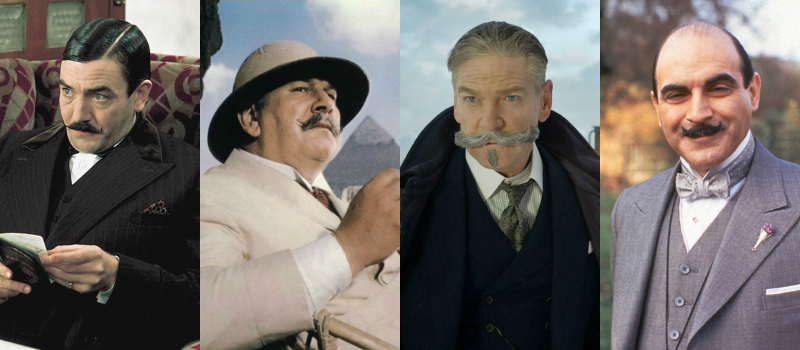From Albert Finney to Sir Kenneth Branagh (and, of course, David Suchet), the screen legacy of Hercule Poirot is a storied one.
Of all Christie’s detective novels, Murder on the Orient Express perhaps lends itself best to a blockbuster: it promises grand set-pieces, an opulent train cutting through rugged, snow-capped scenery, and a neatly contained roster of suspects ripe for starry casting. Poirot himself is a prize role—bombastic yet introspective, a fastidious dandy and a relentless truth-seeker. Albert Finney encapsulated all of this in Sydney Lumet’s 1974 adaptation.
When a murder takes place aboard the snowbound luxury service, the world’s most pre-eminent detective (with not a deerstalker in sight) is on hand to offer not just assistance but a first-class brain.
Finney, then in his thirties but heavily aged with makeup, endured a gruelling routine: he was reportedly collected by ambulance from his West End theatre engagement each morning so prosthetics could be applied while he slept. Pale, dressed in black, with hair lacquered to an almost laminated sheen and a moustache sharp enough to be lethal, he has a faintly vampiric aspect. His Poirot is unpredictable and brusque—eyes sparkling with caprice during interrogation or glowing with feverish delight at the discovery of some “cloo-hoo.” More menacing than camp, he is a far cry from the genial, egg-headed figure David Suchet would later immortalise.
Finney’s incarnation is supported—or rather, suspected—by a gallery of memorable performances. Anthony Perkins is a twitchy young secretary with thinly veiled mother issues; Ingrid Bergman won an Oscar for her turn as the pious, broken-English-speaking Miss Ohlsson; and Michael York cuts a dashing figure as a Hungarian count in a magnificent camelhair coat, batting away bazaar vendors like gnats.
But it is John Gielgud who most nearly steals the film, gliding through scenes as the sombre manservant Beddoes, armed with Paul Dehn’s delightfully dry dialogue:
“Is it about sex?”
“No, it’s about ten-thirty, Mr Foscarelli.”
Every passenger has a motive. Some take a certain pleasure in attempting to hoodwink Poirot—most notably Wendy Hiller’s imperious Countess Andrenyi, whose makeup renders her less generically vampiric than specifically reminiscent of Gary Oldman’s aged Count in Bram Stoker’s Dracula.
Poirot, of course, coolly assembles the facts and pokes holes in their stories. The mesmerising 28-minute dénouement—Finney’s tour-de-force monologue—is a masterclass in narrative unravelling.
With its Art Deco finery and sweeping romantic score, Lumet’s film could easily have slipped into mere romp territory, as many later Christie adaptations did. But his direction infuses the luxury berths and glass-panelled dining car with creeping claustrophobia. Lumet’s acuity with confined spaces—think the diminishing aspect ratio of 12 Angry Men—is unmistakable. The opening sequence, set on a dark Long Island estate and evoking the Lindbergh kidnapping, is genuinely eerie, spinning-newspaper montage notwithstanding. It is remote enough from the subsequent plot, which begins five years later in Istanbul, to lend the film a deep undercurrent of mystery.
Poirot would not again feel so tonally precise on screen for decades. When Finney declined to return—reportedly because of the makeup ordeal—the role passed to the more amiable Peter Ustinov. Broad, effusive, and fond of pontificating about evil, Ustinov made a genial elder-statesman Poirot, well suited to the lighter, more knockabout tone of Death on the Nile(1978) and Evil Under the Sun (1982). Even Nino Rota’s score can’t elevate the latter beyond cosy, middle-class entertainment.
It is difficult to imagine Finney tolerating Angela Lansbury’s gloriously batty Salome Otterbourne. Before becoming the world’s most famous fictional mystery writer—Jessica Fletcher—Lansbury played Christie’s other great detective, Miss Marple, in 1980’s The Mirror Crack’d. It’s a comparatively toothless take, failing to exploit the eccentricity that later powered her Sweeney Todd performance, and losing ground to Elizabeth Taylor’s troubled movie star.
The Ustinov films followed a reliable template: an exotic location, a celebrity ensemble, and posters featuring Ustinov’s worried expression surrounded by floating heads (sometimes floating torsos). A peculiar connective thread binds Lumet’s Murder and Guillermin’s Death. The former features Sean Connery, who’d previously had a more explosive journey aboard the Orient Express in From Russia With Love (1963). The latter stars Lois Chiles, whose brush with mortality in Egypt recalls her role in The Spy Who Loved Me; the following year she appeared as a Bond girl in Moonraker, essentially a repurposing of the earlier film’s plot.
Poirot would not fully re-enter British cultural consciousness until Suchet’s defining tenure in Agatha Christie’s Poirot(1989–2013), which adapted all but one of Christie’s stories. Small, precise, immaculate, Suchet brought not only self-containment but a flash of contained fury—a moral indignation that would flare when he confronted a particularly heinous criminal. No other Poirot has journeyed from Styles (Christie’s first Poirot novel) to Curtain (her last), tracing the character’s entire arc. For many—Finney devotees aside—Suchet remains the definitive interpretation.
Yet as Benedict Cumberbatch and Robert Downey Jr. revitalised Sherlock Holmes despite towering predecessors, Kenneth Branagh carved out his own space with his lush, maximalist trilogy (Murder on the Orient Express (2017), Death on the Nile (2022), and A Haunting in Venice (2023)). If nothing else, Branagh offered glossy, old-fashioned entertainment—and as flamboyant a moustache as any Christie could have imagined.
Murder on the Orient Express (1974), Death on the Nile, The Mirror Crack’d, and Evil Under the Sun are available as part of The Agatha Christie Collection on 4K UHD & Blu-ray from 24 November 2025.
